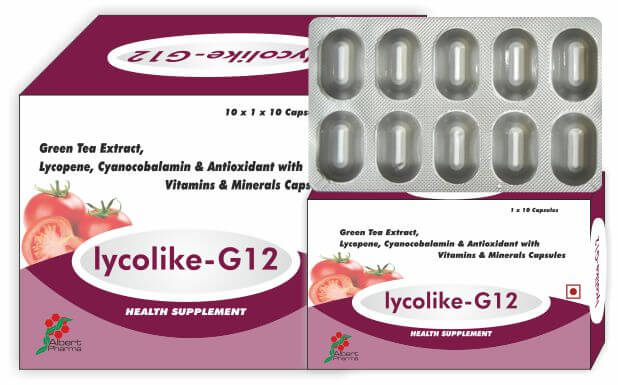Capsule Presentation
Nutritional Information:Composition is used as supplements providing various vitamins that are essential substances that our bodies need to develop and function normally. The known vitamins include A, C, D, E, and K, and the B vitamins: thiamin (B1), riboflavin (B2), niacin (B3), pantothenic acid (B5), pyridoxal (B6), cobalamin (B12), biotin, and folate/folic acid. Lycopene has been linked to health benefits ranging from heart health to protection against sunburns and certain types of cancers. Polyphenols present in green tea exctract might be able to prevent inflammation and swelling, protect cartilage between the bones, and lessen joint degeneration. Green tea contains 2% to 4% caffeine, which affects thinking and alertness, increases urine output, and may improve the function of brain messengers. The combination is used as an antioxidant and protector of the cells.
- It provides protection against pollutants and sunburn.
- It helps prevent eye problems such as night blindness.
- It reduces the level LDL, known as the bad cholesterol, thus lowering the risk of cardiovascular problems.
- It keep bones healthy (prevents osteoarthritis)
- It decreases risk of breast cancer, ovarian cancer and other cancers.
Indications and Usage
- Energy production
- Effective in cardiovascular diseases
- Effective in neurodegenerative diseases
- Prevent cell damage in the body
- Weight loss
- Improves liver functions
- Improve the function of neurons as an antioxidant
- Curing certain types of anemia
- Has anti-inflammatory, inflammation-resolving
- Antiarrhythmic
Ingredients Description
Green Tea Extract: Green tea extract usually contains caffeine along with other plant compounds called catechins, including epigallocatechins-3-gallate while catechins have strong antioxidant potential. It is also associated with a lower risk of coronary artery disease. A meta-analysis found that consuming green tea or green tea extract with 150 to 2500 milligrams of catechins daily intke improved patients’ cholesterol profiles.Lycopene is a plant nutrient with antioxidant properties. It’s the pigment that gives red and pink fruits, such as tomatoes, watermelons and pink grapefruit, their characteristic color. Lycopene has been linked to health benefits ranging from heart health to protection against sunburns and certain types of cancers.
Beta Carotene is the precursor of Vitamin A and in the body it is converted in to Vitamin A which is required for a variety of physiological functions in the body especially maintaining the functioning of human eye. It helps in formation of pigment Rhodopsin during dark adaptation and promotes differentiation and maintains structural integrity of epithelia. Vitamin A helps in mucous production. Vitamin A regulates proper bone growth and improves resistance to infection. It is also required better immunity.
Contra-indications of Beta Carotene:
1. Hypervitaminosis A
2. Hypersensitivity to Beta Carotene
Vitamin B6 or Pyridoxine: Pyridoxine has been used to treats peripheral neuropathy caused by certain drugs such as isoniazid. It has also been used to treat certain genetic disorders such as xanthurenic aciduria, hyperoxaluria. It is one of the major vitamin required by red blood cells. Folic Acid is a type of B vitamin helps your body produce and maintain new cells, and also helps prevent changes to DNA that may lead to cancer. Folic acid is sometimes used in combination with other medications to treat pernicious, aplastic, or normocytic anaemia.
Vitamin B12 Cyanocobalamin:
• Helps keep the nervous system and red blood cells healthy
• Required for the formation of red blood cells and DNA
• Important for protein metabolism
Zinc: It help is synthesis of more than 70 different enzymes. Zinc containing enzymes regulates metabolism of carbohydrates, lipids, and proteins. Zinc fastens wound healing; maintain normal growth rates, balance skin hydration and the senses of taste and smell. It assists normal growth and tissue repair. It boosts cell mediated immunity. It is poorly absorbed when given orally. Zinc is well distributed in tissues lik skeletal muscle, skin, bone, pancreas, kidney, liver, retina, prostate, RBC, and WBC. Zinc is mainly excreted through intestine and only 2% loss in the urine.
Selenium: It is a vital antioxidant, along with vitamin E, it helps protect the immune system and maintain healthy heart function. It is required by pancreas for proper functioning and tissue elasticity and has been shown to protect against radiation and toxic minerals. Raised cardiovascular disorders are associated with selenium-deficiency.
Chromium Picolinate provides chromium. It is a mineral found in low doses in many foods. It plays a role in the metabolism of nutrients through by affecting the hormone insulin. Chromium has been shown to improve insulin sensitivity and alleviate cardiovascular functions, thereby giving credence to the argument that chromium may possess beneficial effects in countering these conditions.
Side Effects
The product is possible safe for most adults. There is no disadvantage associated with the product if taken under the recommended usage however common side effects include Gas, constipation, loose stool, and loss of appetite sometimes happen, especially at the beginning of the regimen.Know About new DCGI Approved Products
Copyright © by Alaina Pharma. All rights reserved.
Created by Alaina Pharma
